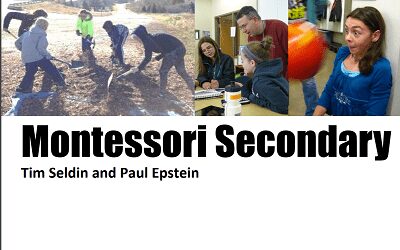Related Posts
A candid conversation with three Montessori Guides of Color
BY DR. CINDY ACKER
“We must never forget,” said Yvette Clarke, “that Black history is American history. The achievements of African Americans have contributed to our nation’s greatness.”
In a period in which we have begun a spiritual practice of opening our eyes to the contributions of those who have historically been invalidated. In this particular issue, we want to recognize a few of the many of those who have made contributions specifically in Montessori education. As we recognize Black History Month, we pause to acknowledge a few teachers of color who are bringing a contribution of their own to their classrooms. The more teachers of color we have in Montessori classrooms, the more we enhance our schools, and provide our children and our staff with positive models of educators and leadership.
Dr. Laura Turner-Essel, parent and psychologist, wrote:
Research shows that Black students experience school as more hostile and demoralizing than other students do, that they are disciplined more frequently and more harshly for typical childhood offenses…, that they are often labeled as deviant or viewed as deficient more quickly than other children, that teachers have lower academic expectations of Black students (which, in turn, lowers those students’ expectations of themselves), and that Black parents feel less respected and less engaged by their children’s teachers and school administrators. Perhaps these are some of the underlying reasons that Black students tend to underperform in most schools across the country.
The truth is that schools are more than academic institutions. They are places where children go to gain a sense of who they are, how they relate to others, and where they fit into the world. The best schools are places that answer these questions positively – ‘you are a valuable human being, you are a person who will grow up to contribute great things to your community, and you belong here, with us, exploring the world and learning how to use your gifts.’ Unfortunately, Black children looking for answers to these universal questions of childhood will often hit a brick wall once they walk into the classroom. If the curriculum does not reflect their cultural experiences, the teachers don’t appear to value them, and they spend most of their time being shamed into compliance rather than guided towards their highest potential, well… what can we really expect? How are they supposed to master basic academic skills if their spirits have been crushed?
Here’s the good news. In my years of school shopping…I have found that there are some educational approaches that consistently provide a safer, more enriching and more affirmative environment for Black children. The Montessori method, developed by Italian physician Maria Montessori and introduced to the U.S. in the early 20th century, is one such approach.
However, to support children of color, research indicates that teachers of color help close achievement gaps for students of color. The report, Diversifying the Teaching Profession: How to Recruit and Retain Teachers of Color, sadly finds that while the population of teachers of color overall is growing, Black and Native American teachers are a declining share of the teacher workforce and the gap between the percentage of Latinx teachers and students is larger than for any other racial or ethnic group.
In the fall 2019 issue of Montessori Public, Dr. Ayize Sabater (AMI-USA, Executive Director) chronicled the gathering of Montessorians who reminded us of the efforts of Black Montessori educators to bring Montessori education to children of color, from Black Montessori preschools founded in the 1920s to the Central Harlem Association of Montessori Parents (CHAMP) and the CHAMP Teacher Education Program (TEP).
The research, the history and lived experiences of others, indicates the emergent need that during the month of February AND every day of every month, children, teachers, and parents, live their own history of people of color. In our Montessori classrooms, we need to hear the voices of our children and teachers. In the information below, we asked teachers of color why they became Montessori teachers, what they see as our greatest challenges and their advice to people of color who are considering becoming Montessori teachers.
RAINA FORD
Lower Elementary
Why did you decide to embark on a journey of becoming a Montessori teacher?
Tiffani Battle I sought Montessori training after working in a school for two years. I was public school trained and had worked in a 1st-grade class for a time before discovering Montessori. I answered an ad out of a local paper and was blown away about the degree of concentration and the level of learning taking place in the Primary class. I have been hooked ever since.
Do you feel that you contribute to children of color or children of more European origin? If so, why?

Raina Ford Honestly, I feel that I make a contribution to any child that I have the pleasure of working with. What I can say is that I feel, as a Black teacher, I have the ability to connect to those children of color who otherwise may not have had that connection because we do still have discrimination and it is very much in schools. As a black teacher to children of European origins, I feel that I show them that people of color are in positions of leadership.
Tiffani Battle I definitely feel I make a difference for children of European descent. I had a child who licked me in my first year of teaching. I asked why and he explained that I looked and smelled like chocolate. At that time, I wore cocoa butter lotion. The child was about six and a half years old, so I was pretty surprised. But I realized then that I was his first encounter. From that moment forward, I used my platform as a teaching experience. In every class I have had, I introduce children to my culture.
What is the greatest obstacle to having more Montessorians of color in the classroom, and what can we do to overcome it?
Raina Ford I think the greatest obstacle to having more Montessorians of color in the classroom is exposure. As a woman of color, I did not know Montessori was a teaching option until I was in my 20’s. We cannot have more Montessorians of color come through the door if we do not share the beauty of Montessori with more of the world. We have to sort of hit people in the face with it because Montessori changed my life. I’m confident that if more educators of color knew about Montessori’s philosophy, we would see more of them taking on the training. Another issue is the cost of the training. We must do more to help support and sponsor educators of color to find and take the training.

Nargees Jumahan One of the obstacles I have had in my training was the lack of people of color as trainees – the lack of people of color in training programs. In the two years of my Montessori training, I encountered only three people of color who were trainers. I felt in my earlier years, my professors (who were of color) had a bigger impact on me as an educator.
Tiffani Battle The greatest obstacle is the actual knowledge of Montessori. It is usually only known in exclusive neighborhoods. If we could do a massive campaign to reach people on the margins, I think it would bring interest from diverse communities. I also believe that in the Montessori community, there is definite discrimination present on all levels. If we can tackle that head-on, it could help people of color to feel more welcome.
What has been your most treasured experience?
Nargees Jumahan My most treasured general experience is sparking curiosity in my students. However, an individual treasured experience involved a student in my class, who recently immigrated to the US and spoke very little English. I shared with her my story of immigration and my struggle with English and the challenge of slowly overcoming it. It completely changed her attitude towards the language. She began to express herself verbally and in writing. In the school, she opened up and connected with other students.
Tiffani Battle My most treasured experience has been to attend a Montessori Conference in Denver a few years back. It was the first time I went to a community event with the Montessorians of Color. It was the best experience to be in a space with others who are just like me. There is something to be said about what happens when one of few becomes one of many.
What is your advice to adults of color who are considering Montessori as their calling?
Raina Ford My advice to an adult of color considering Montessori as their calling, would be to go for it! We need you in our classrooms because we are underrepresented. Do it – and put your whole heart into it because once you enter into the world of Montessori, it really does change you. Taking the Montessori training helped me become more peaceful, and it widened my perspective. It can only add to your life and your qualifications. So if you have the opportunity to take Montessori training, reach out and grab that opportunity.
Nargees Jumahan I think my advice to adults of color seeking Montessori as their career would be to find other Montessorians of colors and build a support system to help them thrive.
Tiffani Battle I would advise this: Come. Join our Montessori world. We are making the world a better place, one student at a time.
If we truly believe that people of color have and are making a contribution to our worldwide tapestry, then we will fully commit to supporting the voice, access, structure, and equitable needs of children, families, and teachers of color. It is then that we can truly make the invitation, as Montessorian Tiffani Battle so aptly put it: “Come. Join our Montessori world. We are making the world a better place one student at a time.”

Dr. Cindy Acker holds degrees in human development, culture and spirituality and a doctorate in educational leadership from UC Berkeley. She is former VP of the National Child Care Association and has served as a public policy adviser for Montessori schools and school associations. She is a five-time award winner in areas of social justice, and has created platforms for school social justice and protocols for school re-entry post covid-19. She was trained by Ursula Thrush and is head of The Child Unique Montessori School and Montessori Elementary School in Alameda.






